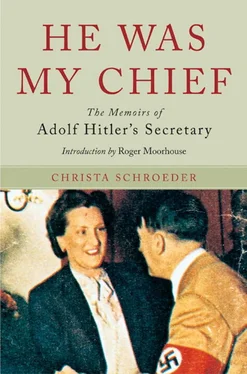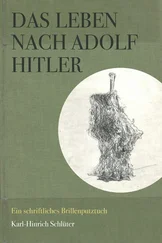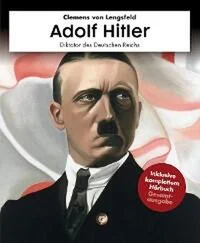Christa Schroeder - He Was My Chief - The Memoirs of Adolf Hitler's Secretary
Здесь есть возможность читать онлайн «Christa Schroeder - He Was My Chief - The Memoirs of Adolf Hitler's Secretary» весь текст электронной книги совершенно бесплатно (целиком полную версию без сокращений). В некоторых случаях можно слушать аудио, скачать через торрент в формате fb2 и присутствует краткое содержание. Город: Barnsley, Год выпуска: 2012, ISBN: 2012, Издательство: Frontline Books, Жанр: История, Биографии и Мемуары, на английском языке. Описание произведения, (предисловие) а так же отзывы посетителей доступны на портале библиотеки ЛибКат.
- Название:He Was My Chief: The Memoirs of Adolf Hitler's Secretary
- Автор:
- Издательство:Frontline Books
- Жанр:
- Год:2012
- Город:Barnsley
- ISBN:978-1-7830-3064-4
- Рейтинг книги:4 / 5. Голосов: 1
-
Избранное:Добавить в избранное
- Отзывы:
-
Ваша оценка:
- 80
- 1
- 2
- 3
- 4
- 5
He Was My Chief: The Memoirs of Adolf Hitler's Secretary: краткое содержание, описание и аннотация
Предлагаем к чтению аннотацию, описание, краткое содержание или предисловие (зависит от того, что написал сам автор книги «He Was My Chief: The Memoirs of Adolf Hitler's Secretary»). Если вы не нашли необходимую информацию о книге — напишите в комментариях, мы постараемся отыскать её.
He Was My Chief: The Memoirs of Adolf Hitler's Secretary — читать онлайн бесплатно полную книгу (весь текст) целиком
Ниже представлен текст книги, разбитый по страницам. Система сохранения места последней прочитанной страницы, позволяет с удобством читать онлайн бесплатно книгу «He Was My Chief: The Memoirs of Adolf Hitler's Secretary», без необходимости каждый раз заново искать на чём Вы остановились. Поставьте закладку, и сможете в любой момент перейти на страницу, на которой закончили чтение.
Интервал:
Закладка:
While the visits to the small tea-house on the Mooslahner Kopf formed part of the daily ritual, the tea-house on the Kehlstein was rarely visited. It was at 2,000 metres, and Hitler felt unwell in the thin air at that altitude. This little house on a mountain top was like a fairytale with which he enjoyed surprising foreign heads of state. [119] The Kehlstein tea-house was a gift to Hitler from the NSDAP for his fiftieth birthday. A road six and a half kilometres in length climbed 1,710 metres to a parking place at a gallery entrance to a lift. This lift rose 124 metres directly into the Kehlstein tea-house. Seidler and Zeigert, Die Führerhauptquartiere , Herbig, p. 261. (TN)
Hitler would often proudly relate the fascination of his visitors for the road which led to the Kehlstein, often skirting the edge of the precipice. Further on they would be impressed by the tunnel drilled into the mountain with its imposing metal lift and then the overwhelming sight over the majestic mountain world of Berchtesgaden. The construction work on the Kehlstein was Martin Bormann’s masterpiece, just as the farm was also developed on his initiative.
While the guests to the small tea-house drank mostly tea or coffee, Hitler and Eva Braun preferred cocoa. The selection of cakes and pastries was very tempting, but Hitler always had apple pie, its pastry breath-thin, low in calories, with thick slices of baked apple. Later cognac and liqueurs were offered. To be a couple of kilos overweight was a serious political matter for Hitler and if it suddenly became difficult to button his jacket at the midriff and the scales confirmed an increase in weight, especially if a Party rally was in the offing, he would reject anything sugary and eat very little. He would always proclaim a diet by declaring: ‘I have to eat less, I am putting on fat, I must lose it!’ His iron will would bring about the hoped-for result, and then he would announce: ‘So, I am back to my old weight, I have lost seven kilos in the last fourteen days!’ Battling his tendency to corpulence was spurred less by vanity than his awareness of people’s disapproval of well-fed orators, and most of all his fear of being ridiculed, both of which kept him on the path of moderation. Göring’s corpulence on the other hand did not worry him, for he found both Göring and Dr Morell well proportioned. One saw that the same fear of ridicule was the reason for his decision not to wear leather shorts, the so-called ‘shorts regalia’ of Bavaria, or be seen in bathing trunks. To his mind such articles of apparel were inappropriate for heads of state.
In the tea-house Hitler loved to hear amusing stories, and people who could tell them were very welcome. It would have been unthinkable to tell obscene stories or a dirty joke in his presence though◦– the bold comedian would receive an ‘if looks could kill’ look and be wise to excuse himself. The spiciest stories he tolerated were the ‘ Graf Bobby’ kind. For example, a nobleman had been invited to a dancer’s flat where they had taken tea and afterwards taken a bath together. Now the nobleman had no peace wondering whether there had been something more on offer from the lady. Hitler would listen to stories like these with a contented smile. Often those present would score points off each other. I remember a conversation between Dr Goebbels and Dr Dietrich, the Reich press secretary. Dr Dietrich had stated that his best ideas came to him in the bath. Goebbels responded: ‘Then you should bathe much more frequently, Herr Doktor Dietrich!’ Sometimes in these sessions Hitler would laugh till he cried.
New arrivals at the Berghof were very welcome at the tea-house, where conversations gradually degenerated into monotonous repetitions for lack of fresh blood. Talk would become a murmur if Hitler fell asleep in an armchair, although as soon as conversation died away he would waken immediately. Hitler also showed great interest should two people get their heads together at the big round table in the tea-house, or perhaps discuss a document in an undertone, or hold an illustrated magazine in the hand and point to a particular section. Then he would want to know about it at once: ‘What’s new there?’ Awareness of this curiosity on his part was often used to skilful effect by clever guests. In this way certain matters could be brought to his attention which were otherwise delicate to broach. The Schirachs liked to bring along American magazines. Once, one contained illustrations of American women working in the armaments industry, in another two women boxed while standing in a sea of herrings. Hitler made fun of both but found the latter particularly objectionable.
While in the tea-house, Eva Braun would get a manservant to find out what new films had arrived from the Propaganda Ministry in Berlin. If Hitler did not require the Great Hall for a conference, after our return (usually by car, Hitler’s vehicle would have an adjutant, the manservant and Blondi besides himself as passengers) she would arrange a film show before the guests retired to dress for dinner.
The procedure for dinner was similar to that at midday. Guests sat near the warm stove or on the sofas with their many cushions which surrounded the great rectangular table. A hanging lamp spread warmth and helped create a pleasant atmosphere. Everybody would be waiting for Hitler who might be talking with a conversation partner either in his room on the first floor or in the Great Hall. Hitler’s talks always had priority, and it was not an infrequent occurrence that dinner would begin very late. As soon as Hitler entered, the midday ritual would be re-enacted: the manservant would appear and announce that dinner was served, and which lady Hitler was to accompany at table.
The mood at dinner was freer and the conversation less forced. The ladies would have dressed a little less formally and applied make-up to enhance their appeal. Eva Braun’s younger sister, who never economised on the lipstick, often motivated Hitler into recounting the children’s fable about how lipstick was manufactured in the Paris sewers. Eva Braun would hold her nose and plead in feigned despair: ‘Oh please, not again!’ The effect of this fable appeared to give Hitler a lot of amusement, which was why he repeated it so often.
In 1926 when Ada Klein was walking in Munich with a female friend they chanced to meet Hitler, who joined them. When a lady wearing heavy make-up passed in an open car, Hitler exclaimed: ‘Now I know why so many men have stomach complaints. During kissing they eat all that stuff on women’s lips!’ One day he selected a very beautiful bloom from a table vase and tossed it rather insolently to a lady, his expectation being that she would put the flower in her hair or jacket. On another occasion upon seeing a woman wearing a flower he offered her another which he thought suited her better. In the earlier years Hitler took pleasure in such gallantry. Ada Klein recalled that in the so-called Eckart Room at the Braunes Haus at Easter 1933 he withdrew a small yellow chick from the table decoration, took her hand, opened it, placed the chick very tenderly inside and closed the hand again.
In the evenings one would remain seated at table a little longer. After the meal, if there was a meeting in the Great Hall a film would be shown in the bowling alley provided there was no bowling. This was rare, however, for the noise from the alley could be very distracting in the Great Hall and generally we would retire to the living room and wait for Hitler’s conference to finish. Conversation had to be carried on in low tones, as mentioned, for the Great Hall was only separated from the living room by a velvet curtain. When Hitler was ready, this would be drawn aside by a waiter and Hitler would then ask: ‘Shouldn’t we sit at the fireside a little?’ [120] Schroeder noted that: ‘the response would usually be muted, for the sessions round the fireplace tended to go on and on, and ended, if Hitler was not in a mood for conversation, in an oppressive, brooding silence.’
That was always the prelude to an evening spent there.
Интервал:
Закладка:
Похожие книги на «He Was My Chief: The Memoirs of Adolf Hitler's Secretary»
Представляем Вашему вниманию похожие книги на «He Was My Chief: The Memoirs of Adolf Hitler's Secretary» списком для выбора. Мы отобрали схожую по названию и смыслу литературу в надежде предоставить читателям больше вариантов отыскать новые, интересные, ещё непрочитанные произведения.
Обсуждение, отзывы о книге «He Was My Chief: The Memoirs of Adolf Hitler's Secretary» и просто собственные мнения читателей. Оставьте ваши комментарии, напишите, что Вы думаете о произведении, его смысле или главных героях. Укажите что конкретно понравилось, а что нет, и почему Вы так считаете.












